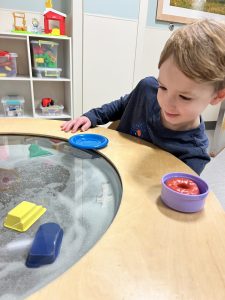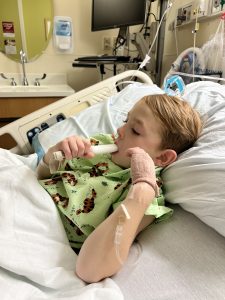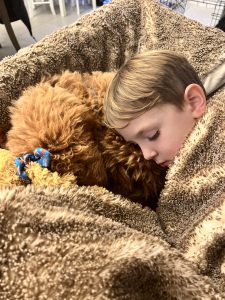One of the most common surgeries in children is a tonsillectomy in which the child’s tonsils are surgically removed. Adenoids can be surgically removed or ear tubes can be surgically placed at the same time the tonsillectomy is performed. As a pediatric nurse, I knew what to expect going into my son’s tonsillectomy, thanks to my experience.
My son had mild sleep apnea and a decline in hearing due to fluids in his ears. The ENT recommended placing ear tubes in both ears and removing his tonsils and adenoids. We set the date for the beginning of November.

Prior to Surgery
- Be honest with your child. Answer questions your child may have. Let your child know why the surgery needs to be done.
- If your child gets ill any time prior to surgery (~1 month before), call the surgeon’s office to let them know and be prepared for surgery to be delayed.
- Follow instructions given by surgeon’s office on when to stop giving food or liquids to your child, and what medications need to be stopped or taken prior to surgery.
A few weeks before his surgery, he ended up in the ER with croup and on a round of steroids. Due to having croup, we had to push his surgery back six weeks to ensure adequate recovery. His new surgery date landed right before Christmas.
Before my son’s tonsillectomy, we discussed his surgery and answered any questions. We showed him a YouTube video of what to expect in the pre-op. We discussed that we would be waiting for him the entire time the procedure was happening and we would be there when he wakes up. Lastly, we made sure he understood he would need to take medicine at home to keep the pain away.
We got a phone call with what time to arrive the night before and instructions on when to stop eating, what medications to hold, and etc.
 Pre-op
Pre-op
- Do pack and bring your child’s favorite lovey, blanket, or book. Anything that will help provide them comfort.
- Be prepared for your child and you to see multiple people during this time. Nurses, surgeon, anesthesia, Child Life specialists.
Surgery day finally arrived and we checked in at the outpatient surgery center for his surgery. When we arrived at the outpatient surgery center, we were brought back to a room where they asked a few more questions. While we waited to see everyone, my son was able to play in a playroom at the end of the hall. It was perfect for keeping his mind off the surgery and not eating. The child life specialist came in and talked to my son in terms he understood about what to expect. She gave him a stuffed puppy and an oxygen mask with stickers for him to decorate and personalize for the OR. Right before they were ready to take him to the OR, he changed into his gown and swallowed some medicine that would help him relax prior to surgery.
During Surgery
- The OR nurse will keep you updated during surgery via text or phone call.
- Use this time to get the medicine you will need for your child’s recovery if possible.
After my son was taken to surgery, we received a text when he was in surgery, when it was wrapping up, and when he was in recovery. While we waited in his room, the pharmacy delivered our son’s medicine that he would need at home. In the end, it took about an hour before we saw him after he was taken to surgery.
 Post-op
Post-op
- Do be prepared for common side effects from anesthesia, like nausea or vomiting.
- Your child may still feel the effects of anesthesia which can cause dizziness.
- Your child will slowly be allowed to have fluids and food. Expect your child to be started on clear liquids such as apple juice, water, popsicles, etc.
My son came back to us in his room already working on a popsicle. When he came back, he fell asleep again and we waited for him to wake up. When he woke up, he did not complain of pain. He ate two popsicles and was released to go. In the end, we were at the hospital from 8 am to 3 pm.
 Recovery
Recovery
- Watch out for complications, which can include bleeding and dehydration. Call the surgeon’s office if any signs or symptoms of complications occur.
- Encourage soft foods when your child eats and keep your child hydrated.
- Keep on top of pain management, especially the first 48-72 hours.
Once we brought him home, we focused on keeping our son comfortable. We alternated between Tylenol and ibuprofen every three hours for the first three days at home to keep his pain under control. After three days, we gave him Tylenol or ibuprofen when his pain peaked (usually once or twice a day). After a week, he was no longer requiring medicine for pain. While he never complained of his throat hurting, his ears were what caused pain the most. We were told to expect him to be home from school for a week. While his surgery was two days prior to Christmas break, we felt he would have been back to school six days after. Every child and their recovery are different.
Was the surgery and recovery worth it? 100% yes!










